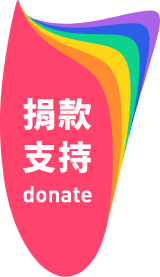TEC’s observation of South Korea’s election!Expanding Taiwan’s horizon of international movements on gender diversity
Date: 2024/04/04-04/09
Location: Seoul, Republic of Korea
Goals: To understand the strategies employed by LGBTQ+ organizations in South Korea during election periods and to observe the role of gender issues in the electoral process. The goal also includes visiting and exchanging insights with various organizations.
Outcomes: Visit more than six South Korean organizations and candidates running for the election, hold a sharing event about Taiwan’s LGBTQ+ advocacy experience, and witness the election process for parliamentary candidates. We gained a deeper insight into South Korea's political landscape and sociocultural dynamics.
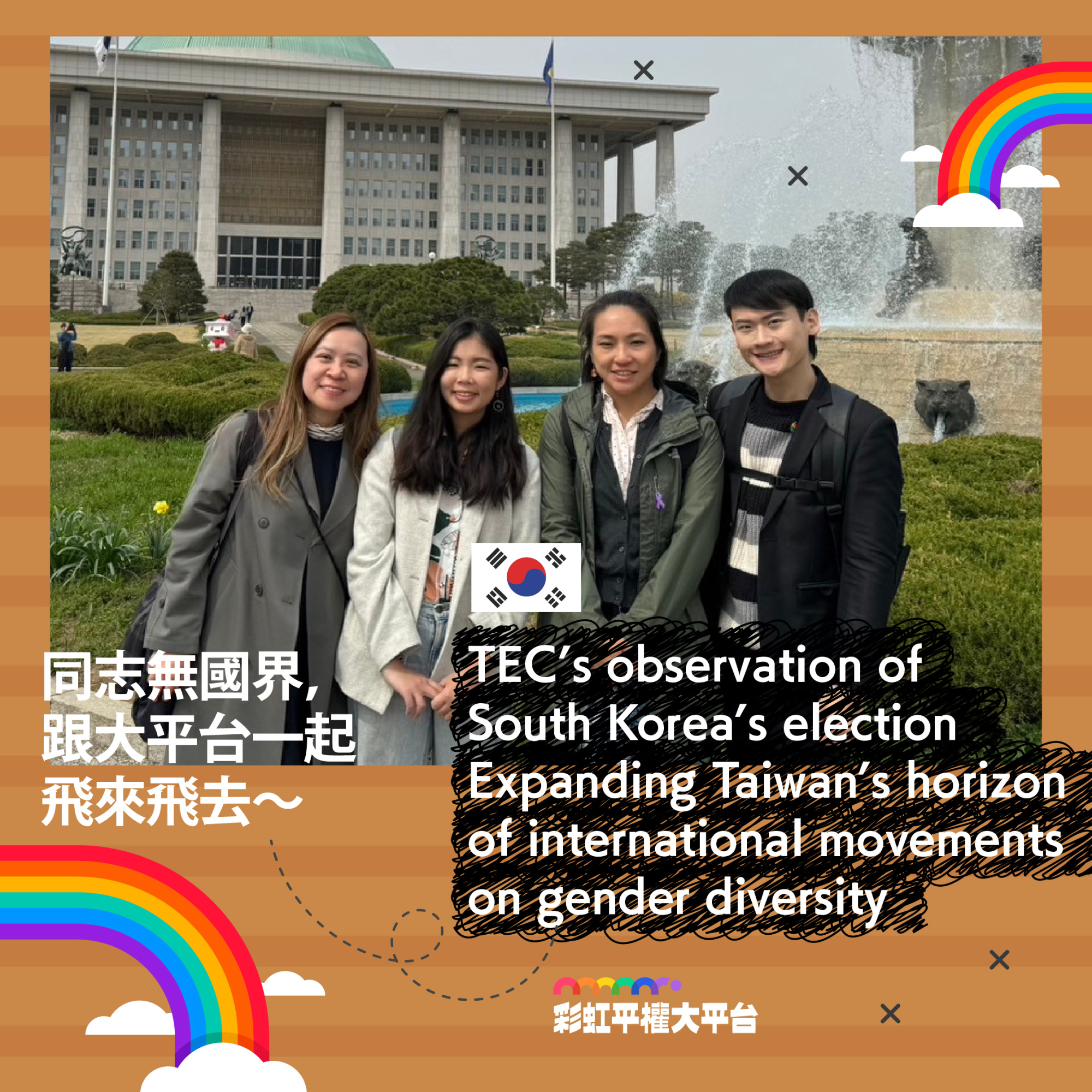
As the first Asian country to legalize same-sex marriage, Taiwan has been a pioneer in issues related to gender diversity. Yet, we do not feel complacent. In April this year (2024), TEC’s Executive Director Joyce Teng, Advocacy & Civic Engagement Project Manager WongWong, Advocacy Specialist Leo, and Senior Program Manager (International Campaign) Manyee traveled together to South Korea. Here is how they shared Taiwan’s experiences with same-sex marriage with the international society.
Becoming international: how Taiwan’s experiences with same-sex marriage may inspire east Asian countries
WongWong believes that, while Taiwan can not exercise its influence through official diplomatic channels for being a nation not yet widely recognized by the international society, as a civil organization, TEC is able to connect with the world through human rights diplomacy. She explains: “The unique situation of Taiwan is a risk as well as a turning point, which presents an opportunity for us to introduce our progress in marriage equality to other Asian countries.”
Executive Director Joyce says that TEC’s newly developed strategies for international advocacy include three major aspects: exchange of experiences, translating international events, and the forming the East Asian Alliance. Following the international work TEC carried out in the past, the exchange of experiences involves hosting foreign visitors, sharing Taiwan’s experiences with same-sex marriage, and interacting with international organizations. Through translating international events, TEC mainly focuses on making international news and information regarding same-sex marriage in different countries available to the Taiwanese public. In the meantime, the East Asian Alliance, which was introduced at the forum held in Singapore, is a new attempt, through which TEC wishes to launch both local and international regional advocacy initiatives by collaborating with our partners in countries like Japan and South Korea.
Meanwhile, Manyee believes that, in addition to exporting our experiences, Taiwan can also learn from other countries via these exchanges. “Thailand’s experiences with and discourses for the marriage equality campaign are completely different from Taiwan, and we can borrow from their future movement strategies.” She emphasizes that such interactions can help TEC explore new advocacy strategies and apply them to our own context. For example, in Taiwan, while the advocacy approaches may be progressive, our tone of expression could be quite tender.
Background to the trip to South Korea
For this field trip to South Korea, everyone had their own goals and plans. WongWong tells us the reasons to visit South Korea: “We hope to observe the election in other countries, to explore what actions civil organizations can take prior to and during election campaigns, and to learn about local advocacy agendas and strategic directions. South Korea was scheduled to hold a parliamentary election in April 2024, so we decided to take a trip there.”
Manyee adds: “This was an experimental project that focused on issues regarding the political participation of individuals with diverse gender identities. The project not only aimed to encourage LGBTQ+ persons to run for office but also to raise the public’s awareness of this issue. In addition to organizing a training camp for the LGBTQ+ interested in politics in Taiwan, we also hoped to foster more exchanges between Taiwan and other countries.” Manyee recalls that, while drafting the project proposal in August 2023, she was already looking up the election dates of other countries, and in the end, South Korea was chosen.
Leo draws a connection to his work: “My job is political advocacy on local levels, and I was hoping to observe South Korea’s election, such as campaign management, strategies, and how issues related to gender diversity would be presented.” This visit was not only an observation but also an opportunity to introduce South Korea’s election practices to Taiwan. Thus, on the trip, he paid much attention to exploring campaign merchandise, promotional vehicles, and politicians’ interactions with their constituents.
Starting from last year, TEC has been preparing itself for this field trip. Manyee tells us: “Our partners in South Korea not only received us but also helped arrange our itinerary.” It’s not simply an exchange of experiences, but also an opportunity to deepen mutual collaboration. According to Manyee: “From planning to execution, the goal of TEC was to facilitate more international advocacy. International advocacy means to view and reflect on gender issues on a regional level, and to analyze these issues from a cross-regional perspective, to lead to more actions outside of Taiwan by connecting these issues with the gender movements in other places, so as to create changes on a larger scale. Such changes may be promoting international laws or challenging some values rooted deeply in local cultures.”
Taiwan vs. South Korea: different election dynamics, different collaboration models among civil organizations
Every team member has brought back their own observations and reflections from this trip. “Elections in South Korea are even livelier than in Taiwan!” WongWong tells us excitedly. Different from Taiwan, where various flags and billboards are common for election campaigns, candidates in South Korea and their supporters tend to use songs to create a festive atmosphere. They even dance together! WongWong also observed that the political parties in Taiwan usually select their respective locations for individual events, while in South Korea, different parties take turns to promote themselves at a fixed location (such as parks). Also, smaller parties often use independent music and complicated lyrics to deliver their ideas and values to attract younger voters, while the two major parties (the Democratic Party and People Power Party) prefer songs with a catchy tunes to draw elder supporters. Moreover, the parties even integrate the title and sequence number for the election into the songs.

Leo’s attention was drawn to the visual presentation of each party: “The Justice Party used the six-colored rainbow on their promotional vehicle. Compared to the political parties in Taiwan, which tend to express their support via the mainstream media or social network platforms, the parties in South Korea show their support for gender issues through more direct actions.” Manyee was also very moved by the rainbow flags printed on the promotional materials of the Justice Party. She mentions that South Korean society was even more oppressed than Taiwan, and supporters needed to face more challenges. “I started to wonder, in a Taiwanese election, how many people dare to do such a thing? Even a well-known LGBTQ+ politician may not choose to bring a rainbow flag with them when canvassing the streets for votes.”
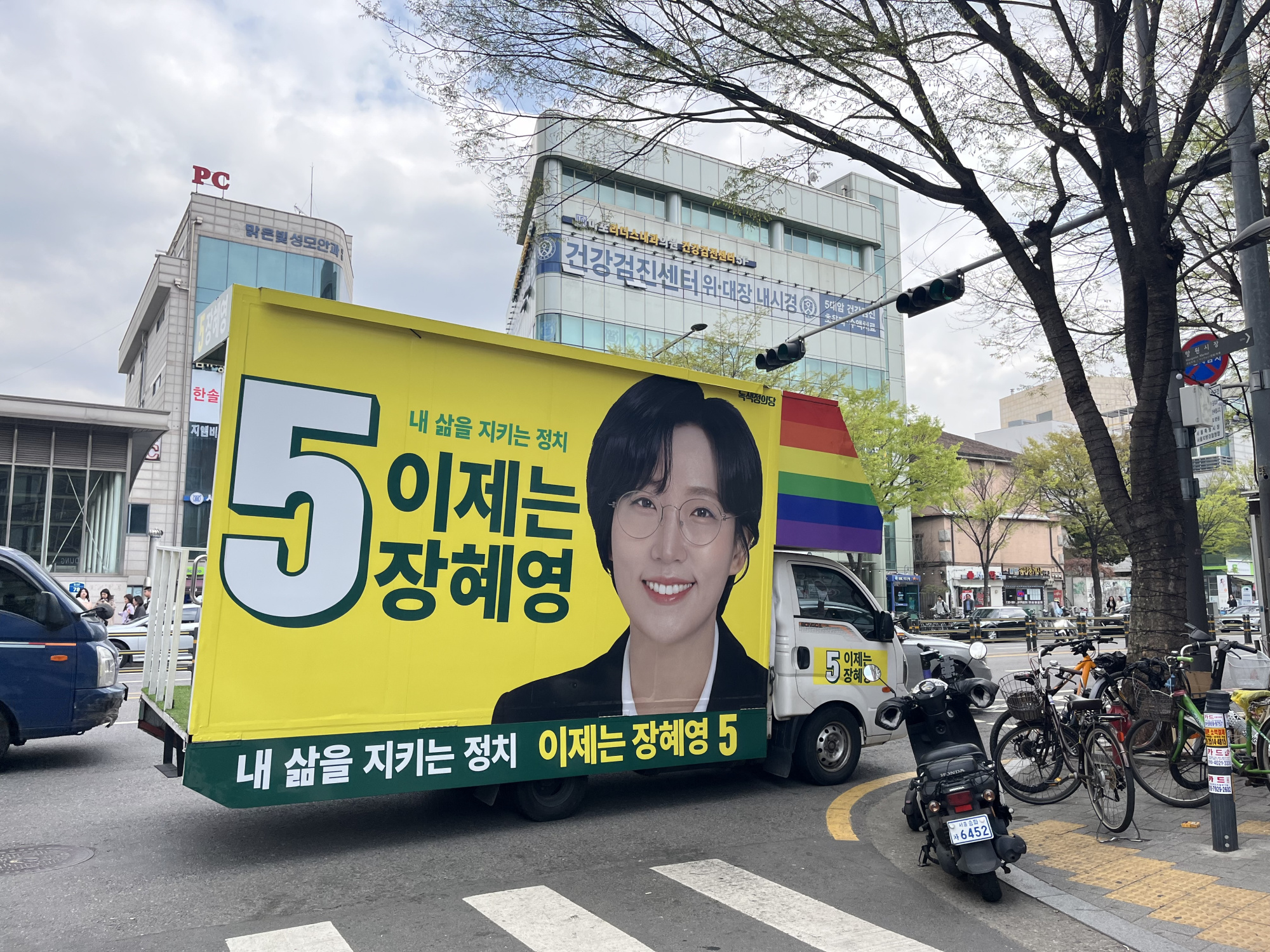
Leo also noticed some differences in terms of the electoral system: in South Korea, parties’ sequence number on the ballots is rather consistent, which is determined by the number of seats the parties possess in the parliament, while the parties with no seats follow the order of Korean alphabets. In this case, the political parties and politicians in South Korea can communicate with voters about their number on the ballots. On the contrary, in Taiwan, candidates’ and parties’ numbers on the ballots are decided by drawing lots in every election. At campaign events, the parties in South Korea take turns promoting themselves on the stage in a park, while in Taiwan, every party would book its individual venue in advance and host their events at the same time separately. According to Leo’s observation at the campaign venues, the Justice Party had the least support, whose composition was however the most diverse. Supporters of the Democratic Party were mostly middle-aged, and the crowd was bigger, while the People Power Party had mainly middle-aged and older voters.
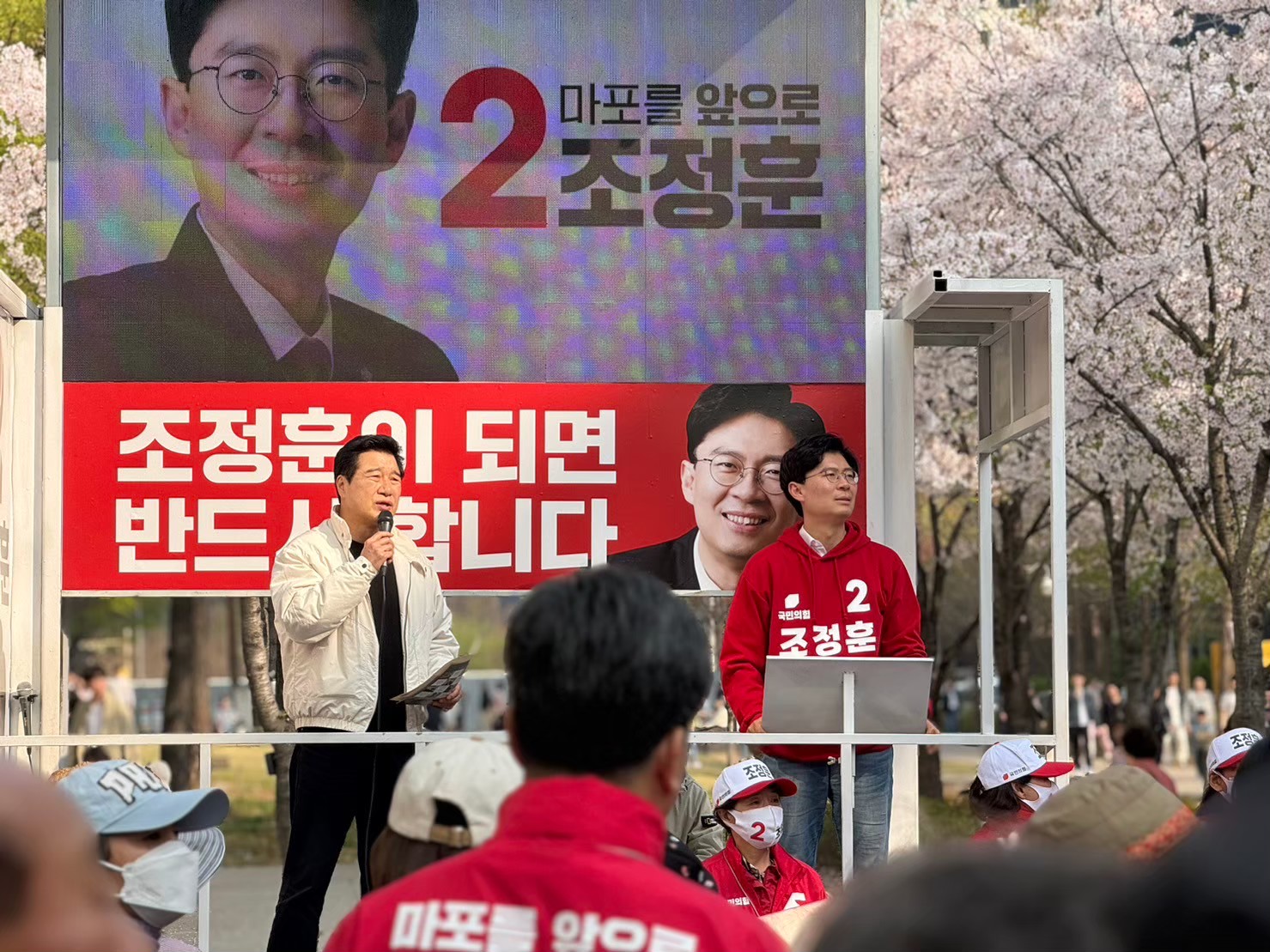
With regard to the collaboration between advocacy groups and political parties in Taiwan and South Korea, Manyee’s observation is: “Small parties in South Korea work together, but there’s less collaboration among the political parties in Taiwan.” Joyce mentions that during their visit, advocacy groups in South Korea convened a press conference to announce their support for smaller parties, an approach different from the advocacy groups in Taiwan, who usually avoid endorsing a specific party during elections. “But this difference in advocacy strategies during election campaigns also has to do with the fact that gender issues are less likely to gain the support of larger parties in South Korea.” On whether to offer an endorsement or not, Manyee reminds us that “how to increase one’s influence while not picking sides is a question that’s worth contemplating for TEC.”
South Korea’s difficult situation for gender discussions vs. diverse gender issues at an impasse in Taiwan
Thanks to the assistance of the South Korean partners, TEC was able to interact with many advocacy groups working on gender diversity during this trip. Manyee mentions that she’s impressed by the collaboration model among the advocacy groups in South Korea: “Many LGBTQ+ organizations form alliances with each other and they usually involve groups of the same people. Thus, an interesting phenomenon can be observed: three meetings are attended by the representatives of three different groups, but they are actually the same group of people.” She believes it is an ideal model to fight against the system when everyone can work jointly to accomplish some goals. Joyce adds that, after the trip, TEC’s members have made the observation that the advocacy groups in South Korea often used terms like “in solidarity.” Meanwhile, the organization advocating for the anti-discrimination law is also made up of groups dedicated to different social movements, demonstrating the uniqueness of the civil society of South Korea.
Other than LGBTQ+ issues, this trip also involved a visit to a women’s organization with a long history. Compared with the women’s groups in Taiwan, who often engage themselves in the advocacy for LGBTQ+ issues, Leo notices that: “the Women’s Center in South Korea is less involved in LGBTQ+ issues, but it also does not express explicit objection.” Leo believes that women’s rights and LGBTQ+ rights are positively correlated. In Taiwan, the two sides often work together, which is a unique context in Taiwan.
In addition to observing the election and paying visits, Joyce and WongWong also attended a launch party for the photography book “The Calm after the Storm,” an event hosted by the marriage equality group in South Korea. WongWong noticed how Taiwan’s experiences inspired local citizens at the launch party. “Seeing that so many South Koreans were willing to listen and participate made me feel that, despite that gender discussions are facing a very difficult situation in South Korea, such as the prevalence of misogyny and the limited scale of advocacy groups that often include just 2 to 3 people, their will for changes is very strong. To a certain extent, our experiences can be a source of inspiration for other countries.” Thus, WongWong has lots of respect for the resilience and proactiveness of both the activists and the public in South Korea.

Leo shares with us his experience of attending a transgender pride party. It was a small gathering organized by transgender individuals, who first started their communication and built their community online. Leo observes: “The room for development of transgender issues in South Korea is limited, but this community is trying to organize and advocate for themselves.” WongWong’s feedback on this party is: “The event was very unique, there was a great DJ, and the atmosphere was chill. There were old-school houses and hills. The entire event felt very hippy. I like it very much!”
How Seoul City Government connects the advocacy experiences of Taiwan, South Korea and Hong Kong: civil energy band empathy
When asked about the most memorable itinerary during this trip, LEO, Manyee, and Joyce all point to the visit to the City Hall of Seoul. When Leo stood outside of the City Hall, he saw an area of memorial for the victims of the Itaewon Halloween crowd crush that was set up by a civil group, within which photos of the victims were displayed and stars made by paper and post-it notes were left by those who came to pay tribute. He tells us: “It’s not a government project, but a strategy adopted by the civil group to put pressure on the government to demand it to acknowledge its mistakes.” Upon entering the City Hall, Leo noticed that the rest area reserved for the public had once been occupied by civil groups and rainbow flags had been hung. “At that moment, Joyce said that it reminded her of the Da-pu incident and the Sunflower Movement, and all of a sudden, overwhelmed by emotions, she couldn’t help but burst into tears,” Joyce adds that it was a shared feeling that transcends different incidents, different countries, and societies. It’s a sense shared by activists that when facing a difficult situation, we’ve all taken action because of our beliefs in the power of civil society.
For Manyee the most memorable are: “When we sat by the window in the lobby on the ground floor, and the sun shone on us, the South Korean hosts were telling us detail the stories of protests taking place at these places, and we could see the banners and posters hanging down from the second floor.” Such a scene reminded her, who was from Hong Kong, of the past protests in Hong Kong, which made her tear up too. “Although different regions face different challenges, our experiences of actions allow us to find resonance in each others’ situation. Even when we can’t find a way out immediately, the strength built by our fellow activists’ support would help the activists in both Taiwan and South Korea carry on with confidence.”
For WongWong, the meaning of these visits is about expanding one’s horizon and extending activists’ passion. “The daily administrative work involved in advocacy is cumbersome, but these visits give us a chance to exchange experiences with people of different cultural backgrounds and to experience different worldviews and perspectives, generating more outcomes.” She thinks these experiences make her feel less lonely: “Interpersonal interactions allow me to deeply appreciate the value of the gender equality movement, as well as reignite my passion for future endeavors. They are an important source of nutrition for me to keep going.”
Follow-up actions post South Korea
Throughout this trip, WongWong believes that the interaction with the partners in South Korea has deepened her understanding of South Korean Activists, as well as allowed her to realize the empathy and strength resulting from the values that transcend national borders. “Being able to visit other organizations in the East Asian Alliance and to discuss the future direction of our collaboration helps us to see more clearly each other’s needs and challenges, fostering more concrete collaborations between the regions.”
For 17 years, gender groups in South Korea have continued to network with various activist organizations and to call on the government to pass the “Anti-Discrimination Act,” as well as to include gender-related chapters and articles in the Act. Joyce tells us that it is an important reason to invite them to join the East Asian Alliance. During this visit, she also managed to learn more about the context of the Act and how each group worked with each other. When Joyce returned to Taiwan, the Department of Human Rights and Transitional Justice happened to be announcing the draft of Taiwan’s “Anti-Discrimination Law,” and our experiences in South Korea helped a lot in terms of the strategies to promote the bill and to form an alliance. Furthermore, this election observation has made Leo further recognize how important the “PrideWatch Manual for Rainbow Voters” TEC published in 2022 has been, and is something that TEC should continue to do. He believes that such a manual informs voters of individual candidate’s support for gender-related issues. “Our badge can clearly recognize candidates’ friendly stance, improving the transparency of political participation.”
In Manyee’s opinion, this visit was significantly meaningful for the internal empowerment of TEC’s members. “Because of this trip, my colleagues were inspired in terms of political participation and advocacy strategies, and these reflections as well as discussions can help TEC to enhance our work.” She also mentions that exchanges with activists from Japan and South Korea may enable TEC to grasp the dynamics of the international state of affairs, as well as to encourage activists to leave their comfort zones. “Through these in-depth conversations with different perspectives, we can re-examine the issues Taiwan faces, and explore new advocacy strategies.”
Anecdotes: queer cultures in daily lives
It happened to be the cherry blossom season in South Korea when TEC visited, and Manyee was shocked by the high hotel costs. “I was thinking how expensive the rooms were when I realized that it was the cherry blossom season. We were able to see cherry blossoms from the hotel window. They were very beautiful!” Manyee says that along with watching cherry blossoms, they also witnessed some campaign events in the park, which added much fun to the trip.
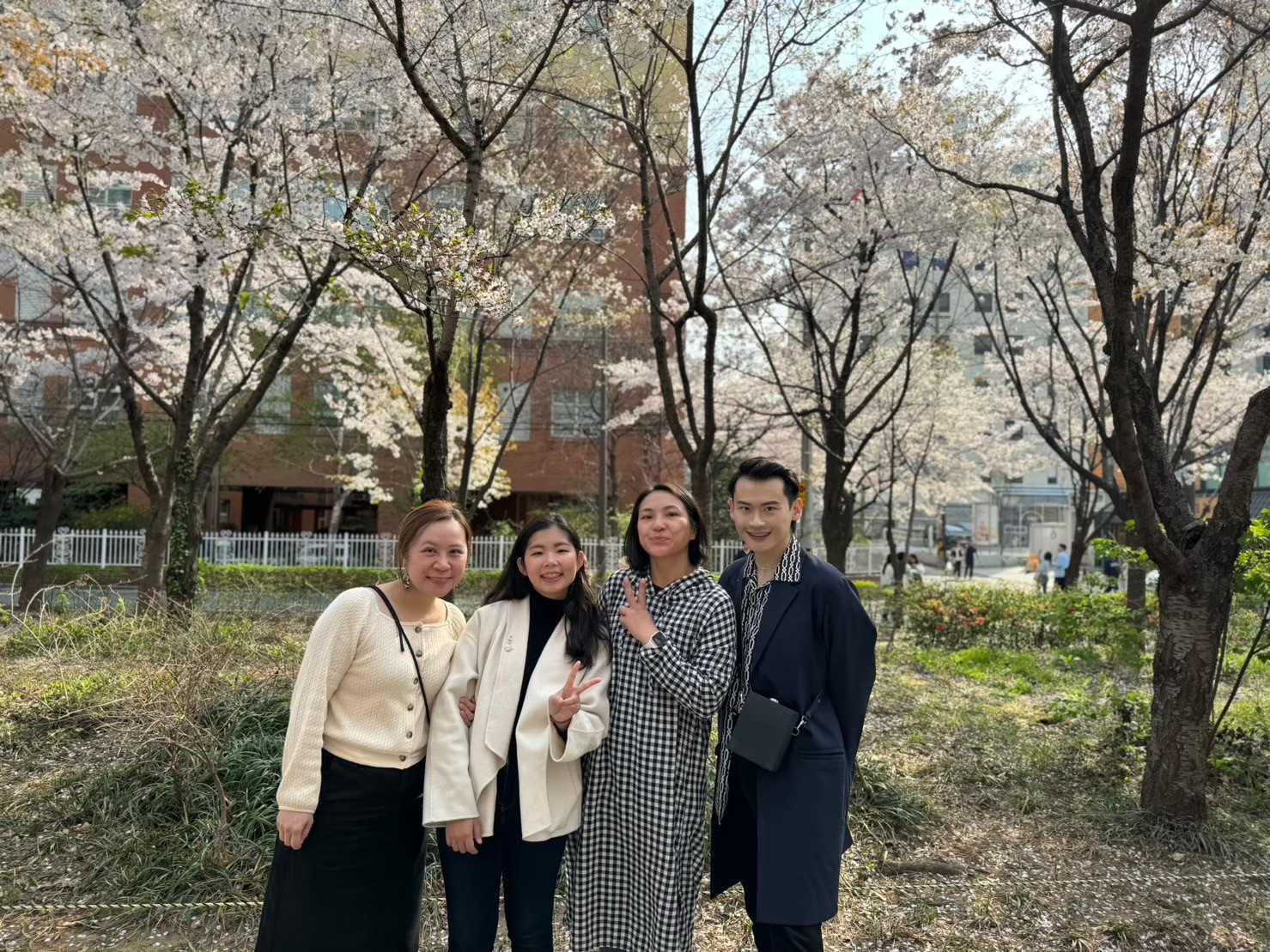
WongWong also shares with us her highlights from the trip other than the cherry blossoms. She was particularly into the local queer bars: “The drinks were great, and they also sold various small objects.” She also mentions that she was very surprised when discovered lots of posters and CDs of Leslie Cheung at the bars. “These places allowed me to experience the queer atmosphere in everyday life.”
Leo talks about his interaction with the marriage equality group in South Korea. “We shared the document about the Dajia Mazu Pilgrimage in Taiwan and discussed with our South Korean partners how to fight against the Christian anti-LGBTQ+ narratives by referring to folk religions. It might as well be described as ‘a stand-off between two gods,’ which inspired our partners in South Korea to reflect on how to promote marriage equality by adopting localized strategies. ”
*Manyee, the senior project manager for international advocacy, left her position at TEC in July. She shared with us about her trip in this travel log before her departure.
We invite all our followers to help us promote our international projects, pushing Asia towards gender equality.
🌍 Support TEC by making a donation, fostering an active “international society!”

